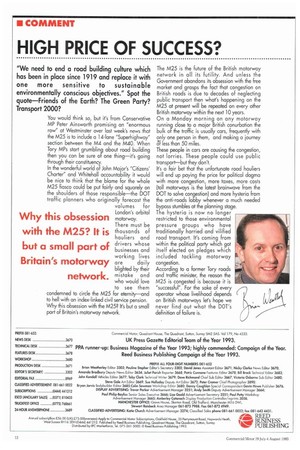HIGH PRICE OF SUCCESS?
Page 14

If you've noticed an error in this article please click here to report it so we can fix it.
"We need to end a road building culture which has been in place since 1919 and replace it with one more sensitive to sustainable environmentally conscious objectives." Spot the quote—Friends of the Earth? The Green Party? Transport 2000?
You would think so, but it's from Conservative MP Peter Ainsworth promising an "enormous row" at Westminster over last week's news that the M25 is to include a 14-lane "Superhighway" section between the M4 and the M40. When Tory MPs start grumbling about road building then you can be sure of one thing—it's going through their constituency. In the wonderful world of John Major's "Citizens' Charter" and Whitehall accountability it would be nice to think that the blame for the whole M25 fiasco could be put fairly and squarely on the shoulders of those responsible—the DOT traffic planners who originally forecast the volumes for London's orbital motorway. There must be thousands of hauliers and drivers whose businesses and working lives are daily blighted by their mistake and who would love to see them condemned to circle the M25 for eternity—and to hell with an index-linked civil service pension. Why this obsession with the M25? It's but a small part of Britain's motorway network. The M25 is the future of the British motorway network in all its futility. And unless the Government abandons its obsession with the free market and grasps the fact that congestion on British roads is due to decades of neglecting public transport then what's happening on the M25 at present will be repeated on every other British motorway within the next 10 years. On a Monday morning on any motorway running close to a major British conurbation the bulk of the traffic is usually cars, frequently with only one person in them, and making a journey Of less than 50 miles.
These people in cars are causing the congestion, not lorries. These people could use public transport—but they don't. It's a fair bet that the unfortunate road hauliers will end up paying the price for political dogma with more congestion, more taxes, more costs (toll motorways is the latest brainwave from the DOT to solve congestion) and more hysteria from the anti-roads lobby whenever a much needed bypass stumbles at the planning stage. The hysteria is now no longer restricted to those environmental pressure groups who have traditionally harried and vilified road transport. It's coming from within the political party which got itself elected on pledges which included tackling motorway congestion. According to a former Tory roads and traffic minister, the reason the M25 is congested is because it is "successful". For the sake of every operator whose livelihood depends on British motorways let's hope we never find out what the DOT's definition of failure is.








































































